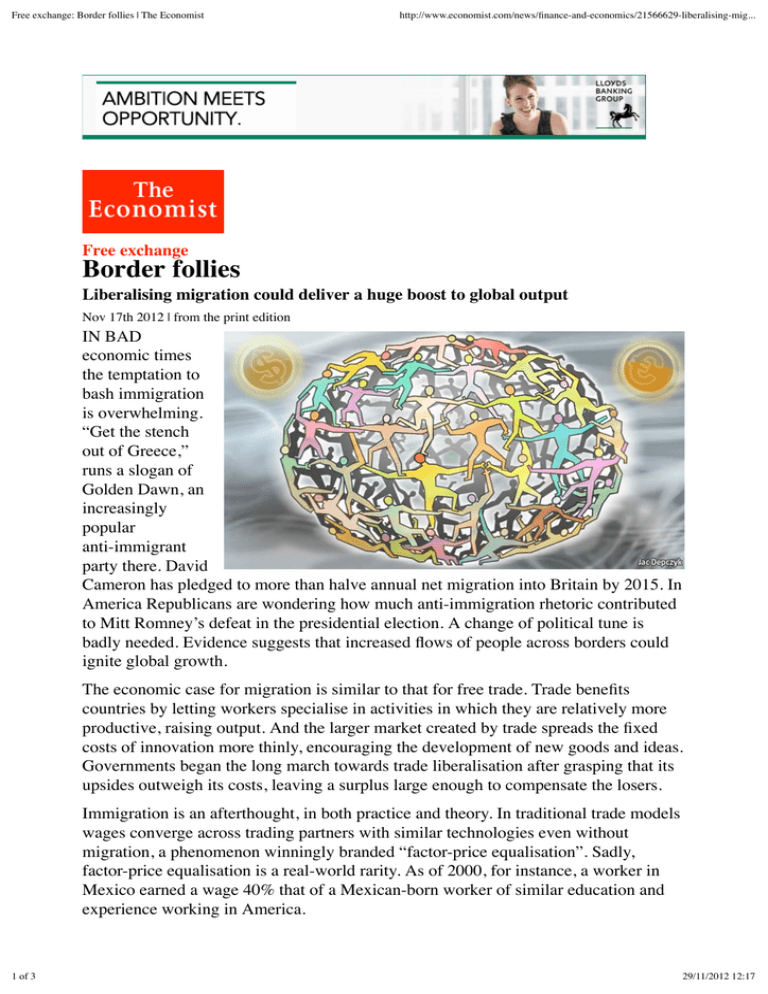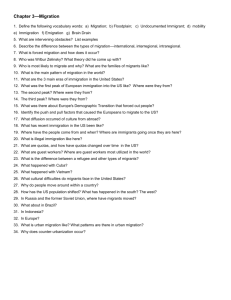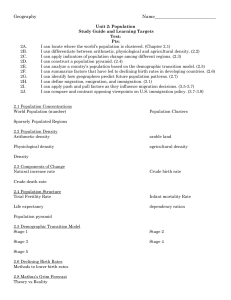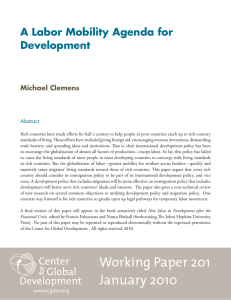Free exchange: Border follies | The Economist
advertisement

Free exchange: Border follies | The Economist http://www.economist.com/news/finance-and-economics/21566629-liberalising-mig... Free exchange Border follies Liberalising migration could deliver a huge boost to global output Nov 17th 2012 | from the print edition IN BAD economic times the temptation to bash immigration is overwhelming. “Get the stench out of Greece,” runs a slogan of Golden Dawn, an increasingly popular anti-immigrant party there. David Cameron has pledged to more than halve annual net migration into Britain by 2015. In America Republicans are wondering how much anti-immigration rhetoric contributed to Mitt Romney’s defeat in the presidential election. A change of political tune is badly needed. Evidence suggests that increased flows of people across borders could ignite global growth. The economic case for migration is similar to that for free trade. Trade benefits countries by letting workers specialise in activities in which they are relatively more productive, raising output. And the larger market created by trade spreads the fixed costs of innovation more thinly, encouraging the development of new goods and ideas. Governments began the long march towards trade liberalisation after grasping that its upsides outweigh its costs, leaving a surplus large enough to compensate the losers. Immigration is an afterthought, in both practice and theory. In traditional trade models wages converge across trading partners with similar technologies even without migration, a phenomenon winningly branded “factor-price equalisation”. Sadly, factor-price equalisation is a real-world rarity. As of 2000, for instance, a worker in Mexico earned a wage 40% that of a Mexican-born worker of similar education and experience working in America. 1 of 3 29/11/2012 12:17 country relative to the developing one. True, a rapid burst of immigration mig temporarily reduce wages. But if the pace of movement is slow enough to all investment to adjust, borders could open without any wage dislocation in eith or destination economies. Migrants themselves would benefit handsomely, ho In a new paper* John Kennan of the University of Wisconsin-Madison estim opening borders could raise the average wage of workers from developing co by $10,100 a year, or more than 100%, thanks to the large rise in the incomes opting to migrate. Those bigger incomes should swell global GDP. In a recent report Sharun Mu the University of Warwick calculates the effect of movement by half of the d world’s workforce to the rich world. Such a vast migration could never happe practice, of course, but as a thought exercise it is instructive. If migration clo quarter of the migrants’ productivity gap with the rich world, their average in would rise by $7,000. That would be enough to raise global output by 30%, o $21 trillion. Other studies find even bigger effects. A 2007 paper by Paul Kle at Simon Fraser University, and Gustavo Ventura, now at Arizona State Univ reckons that full labour mobility could raise global output by up to 122%. Su swamp the benefits of eliminating remaining barriers to trade, which amount 1.8-2.8% of GDP, reckons Mr Mukand. Even a modest (and more practical) easing of restrictions could be very rewa Lant Pritchett of Harvard University estimates that just a 3% rise in the rich-w labour force through migration would yield annual benefits bigger than those eliminating remaining trade barriers. The incorporation of women into the ric workforce provides an analogy: this expanded the labour supply and the scop specialisation without displacing the “native” male workforce. Rich-world residents nonetheless worry that migrants will gain at their expen a survey of research on the topic Francine Blau and Lawrence Kahn of Corne University find that few studies turn up a negative impact on native wages. In paper on western Europe Francesco D’Amuri of the Italian central bank and G Peri of the University of California, Davis find that immigration encourages n take more complex work. Such “job upgrades” are responsible for a 0.6% inc native wages for each doubling in immigrant labour-force share. Where imm disadvantages subsets of the population, Gordon Hanson of the University of California, San Diego reckons that charging an entry fee to migrants or their employers could help pay for training or benefits for those who lose out. A frosty welcome Advanced economies may also fret for their budgets. In a survey of fiscal stu 2 of 3 markets to invest in education, including among those who opt to stay put. Immigration generates remittance flows back home; informal links facilitate country trade and investment. If policymakers can see past their fear of the fo the dividends could be huge. Sources "Open borders", by John Kennan, NBER Working Paper #18307, August 2012 "International migration, politics and culture: the case for greater labour mobility", by Sharun M Chatham House Policy Paper, October 2012 "TFP differences and the aggregate effects of labor mobility in the long run", by Paul Klein and Ventura, Berkeley Electronic Journal of Macroeconomics, 2007 "Let their people come: breaking the gridlock on global labor mobility", by Lant Pritchett, 2006 "Immigration and the distribution of incomes", by Francine Blau and Lawrence Kahn, NBER W Paper #18515, November 2012 "Immigration, jobs and employment protection: evidence from Europe before and during the Gr Recession", by Francesco D'Amuri and Giovanni Peri, NBER Working Paper #17139, June 2011 "The economics and policy of illegal immigration in the United States", by Gordon Hanson, Mig Policy Institute, 2009 "Economic impacts of immigration: a survey", by Sari Pekkala Kerr and William Kerr, Finnish E Papers, Spring 2011 Economist.com/blogs/Free exchange (http://www.economist.com/blogs/Free%20exchange) from the print edition | Finance and economics Copyright © The Economist Newspaper Limited 2012. All rights reserved. 3 of 3 Accessibility Privacy policy Cookies info




